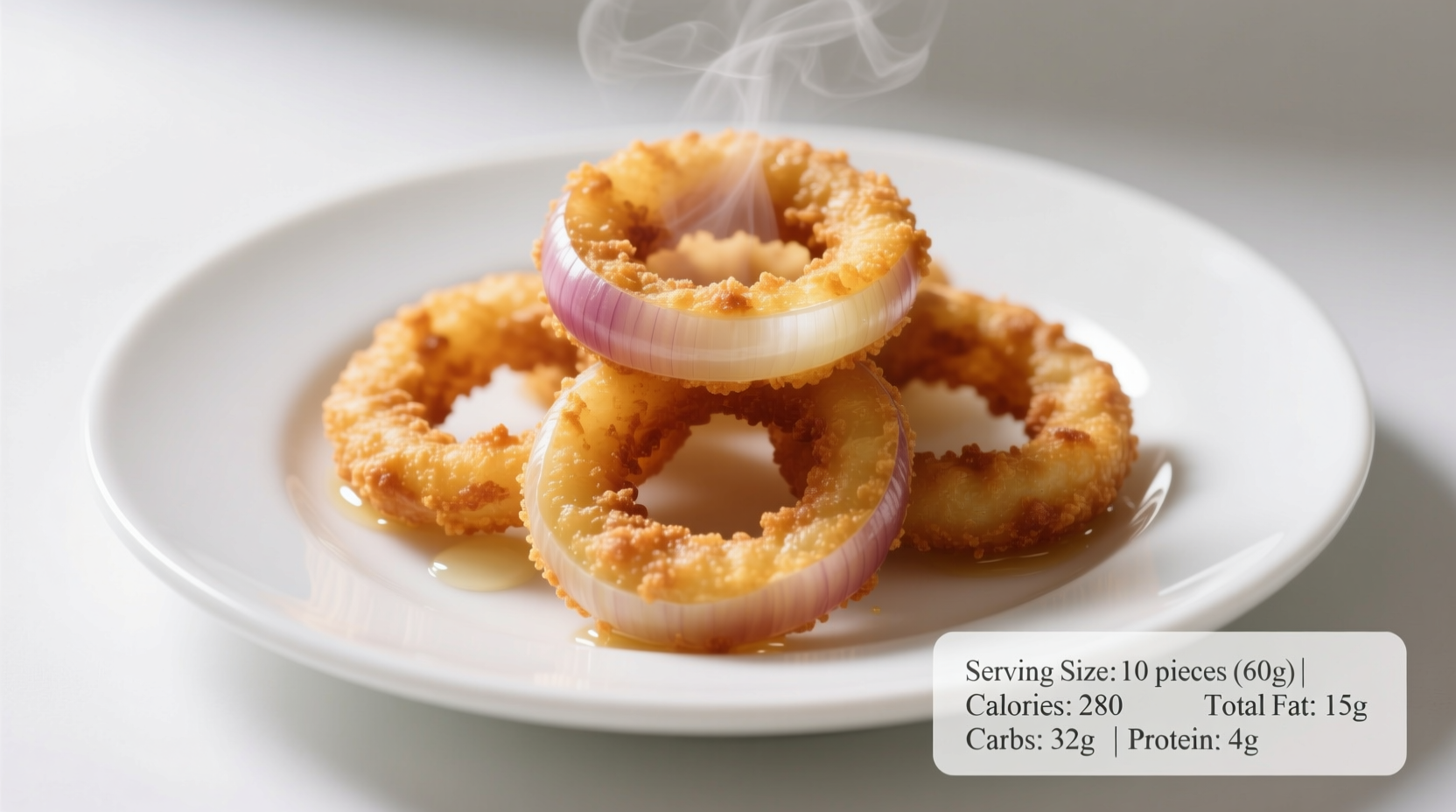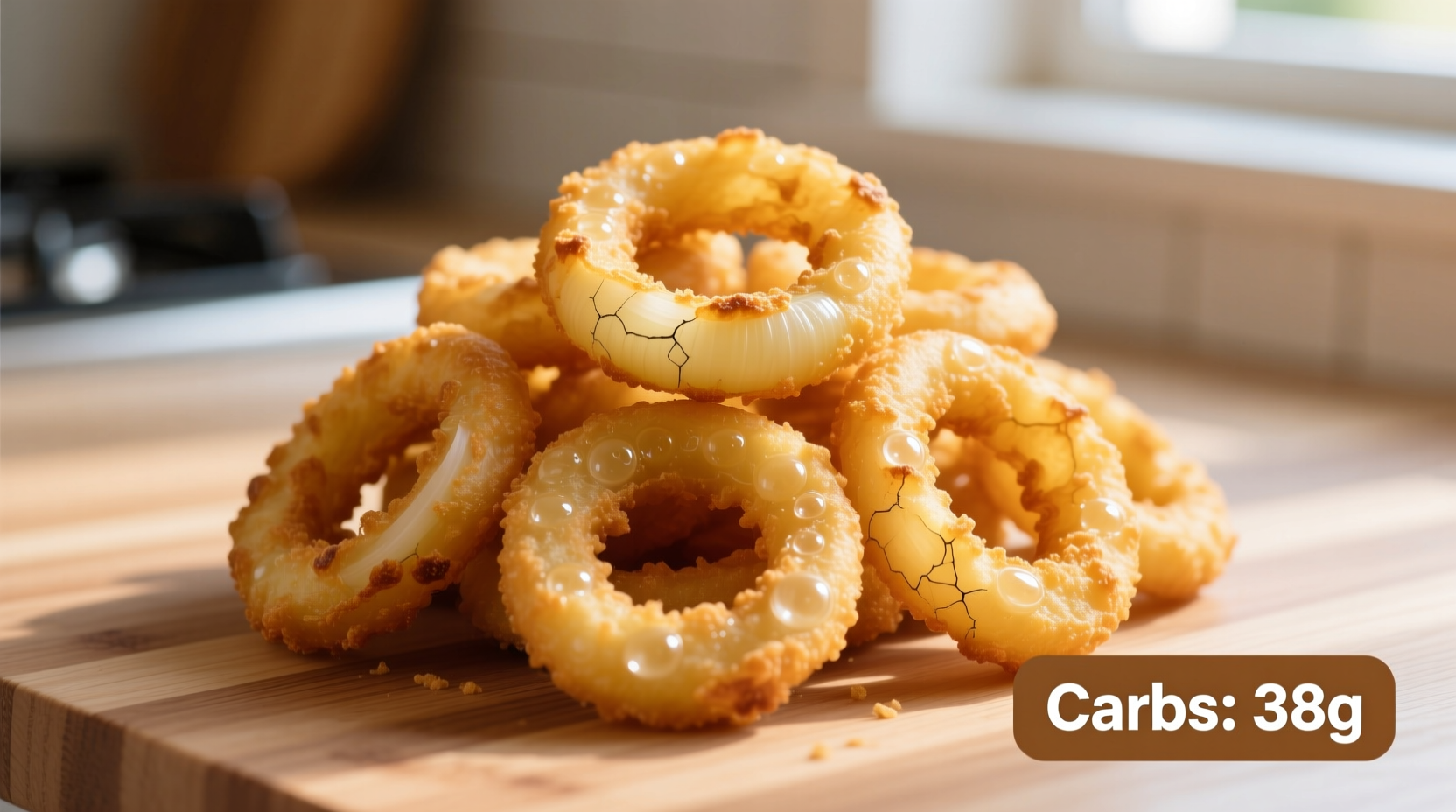A standard serving of onion rings (about 3.5 ounces or 100 grams) contains approximately 35-40 grams of carbohydrates, with 2-3 grams coming from dietary fiber and 3-5 grams from natural sugars in onions. The majority of carbs come from the flour-based batter used in preparation.
Understanding Carb Content in Your Favorite Crispy Snack
Whether you're watching your carbohydrate intake for health reasons or following a specific diet plan, knowing exactly what's in your favorite foods is essential. Onion rings, with their irresistible crunch and savory flavor, are a popular side dish—but they pack a significant carb punch that many diners don't anticipate.
How Carbs Break Down in Onion Rings
The carbohydrate content in onion rings comes from two primary sources: the onion itself and the batter coating. While onions naturally contain sugars (about 5g per 100g of raw onion), the real carb contributor is the batter—typically made from wheat flour, which is high in carbohydrates.
When onions are sliced, battered, and fried, the transformation significantly increases their carb density per serving. What starts as a relatively low-carb vegetable becomes a higher-carb indulgence through the preparation process.
Carb Content Comparison: Different Preparation Methods
| Preparation Method | Serving Size | Total Carbs | Dietary Fiber | Sugars |
|---|---|---|---|---|
| Restaurant-style (deep fried) | 3.5 oz (100g) | 35-40g | 2-3g | 3-5g |
| Homemade (standard batter) | 3.5 oz (100g) | 30-35g | 2g | 3g |
| Oven-baked (light coating) | 3.5 oz (100g) | 25-30g | 2g | 3g |
| Gluten-free batter version | 3.5 oz (100g) | 28-33g | 3-4g | 3g |
Source: USDA FoodData Central (accessed September 2025)
Restaurant vs. Homemade: Significant Carb Differences
When ordering onion rings at restaurants, portion sizes often exceed standard serving measurements. A typical restaurant side order (about 4-6 ounces) can contain 45-60 grams of carbohydrates—equivalent to 3-4 slices of bread.
Major fast-food chains report varying carb counts:
- Chain A (6-piece serving): 42g total carbs
- Chain B (small order): 58g total carbs
- Chain C (regular serving): 39g total carbs
These variations highlight why understanding portion sizes is crucial when tracking carb intake. The batter thickness, oil absorption during frying, and specific ingredients used all contribute to these differences.

Putting Onion Rings Carbs in Context
For perspective, the Dietary Guidelines for Americans recommend that carbohydrates make up 45-65% of your total daily calories. For a 2,000-calorie diet, this translates to 225-325 grams of carbohydrates per day.
A single serving of onion rings represents approximately 12-18% of your daily carb allowance on a standard diet. For those following low-carb diets (typically 20-50g of carbs per day), even a small serving of onion rings could exceed your entire daily carb limit.
Practical Tips for Managing Carb Intake
If you enjoy onion rings but need to monitor your carb consumption, consider these practical strategies:
- Share portions - Split an order with a friend to reduce your individual intake
- Request modifications - Some restaurants will provide a lighter batter option upon request
- Try oven-baked alternatives - Homemade versions with panko breadcrumbs can reduce carb content by 20-25%
- Pair with protein - Combining onion rings with a protein-rich main course slows carbohydrate absorption
- Check nutrition facts - Many chains now provide detailed nutrition information online or in-store
Understanding Context Boundaries
It's important to recognize that carb counts apply specifically to traditional onion rings made with wheat flour batter. Alternative preparations change the nutritional profile significantly:
- Gluten-free versions using almond flour or coconut flour have different carb profiles
- "Naked" onion rings (simply sliced and fried without batter) contain only the natural carbs from onions
- Some specialty restaurants offer low-carb alternatives using alternative batters
Additionally, the glycemic impact of onion rings differs from other high-carb foods due to the combination of fiber from onions and the frying process, which affects how quickly carbohydrates are metabolized.
Health Considerations Beyond Carbs
While carb content is important, it's just one aspect of onion rings' nutritional profile. The deep-frying process adds significant fat content (typically 15-20g per serving), and the sodium content can be high (300-500mg per serving).
On the positive side, onions themselves contain beneficial compounds like quercetin and sulfur compounds with potential health benefits. However, these benefits become less significant when onions are heavily battered and fried.
For those managing blood sugar levels, the combination of high carbs and high fat in traditional onion rings can create a more complex metabolic response than foods with carbs alone.
Smart Swaps for Lower-Carb Alternatives
If you're looking for similar textures with fewer carbs, consider these alternatives:
- Zucchini fries - Naturally lower in carbs with similar crispy texture when properly prepared
- Eggplant slices - Can be breaded and baked for a satisfying alternative
- Radish slices - When roasted, develop a surprisingly similar texture to onion rings
- Portobello mushroom strips - Offer a meaty texture with minimal carbs
These alternatives provide similar satisfying textures while significantly reducing carbohydrate content—typically to 5-10g per serving.
Frequently Asked Questions
How many carbs are in a typical serving of onion rings?
A standard serving of onion rings (approximately 3.5 ounces or 100 grams) contains 35-40 grams of total carbohydrates. This includes 2-3 grams of dietary fiber and 3-5 grams of sugars, with the majority coming from the flour-based batter.
Are onion rings suitable for a low-carb diet?
Traditional onion rings are generally not suitable for strict low-carb diets (typically 20-50g carbs per day), as a single serving often exceeds the daily carb limit. However, modified versions with lighter batter or alternative preparation methods can reduce carb content to make them more compatible with moderate low-carb approaches.
Do homemade onion rings have fewer carbs than restaurant versions?
Homemade onion rings typically contain 5-10g fewer carbs per serving compared to restaurant versions because you can control batter thickness and use less oil absorption during frying. A standard homemade serving (100g) contains approximately 30-35g of carbs versus 35-40g in restaurant-style preparations.
What makes onion rings high in carbohydrates?
The primary source of carbohydrates in onion rings comes from the flour-based batter used in preparation. While onions themselves contain about 5g of carbs per 100g, the batter coating significantly increases the carb content. The deep-frying process doesn't add carbs but does increase calorie density through fat absorption.
Can I make lower-carb onion rings at home?
Yes, you can create lower-carb versions by using alternative batters like almond flour or coconut flour, reducing batter thickness, or trying oven-baked methods instead of deep frying. Some recipes use egg wash with minimal coating to achieve crispiness with significantly fewer carbs (25-30g per serving instead of 35-40g).











 浙公网安备
33010002000092号
浙公网安备
33010002000092号 浙B2-20120091-4
浙B2-20120091-4